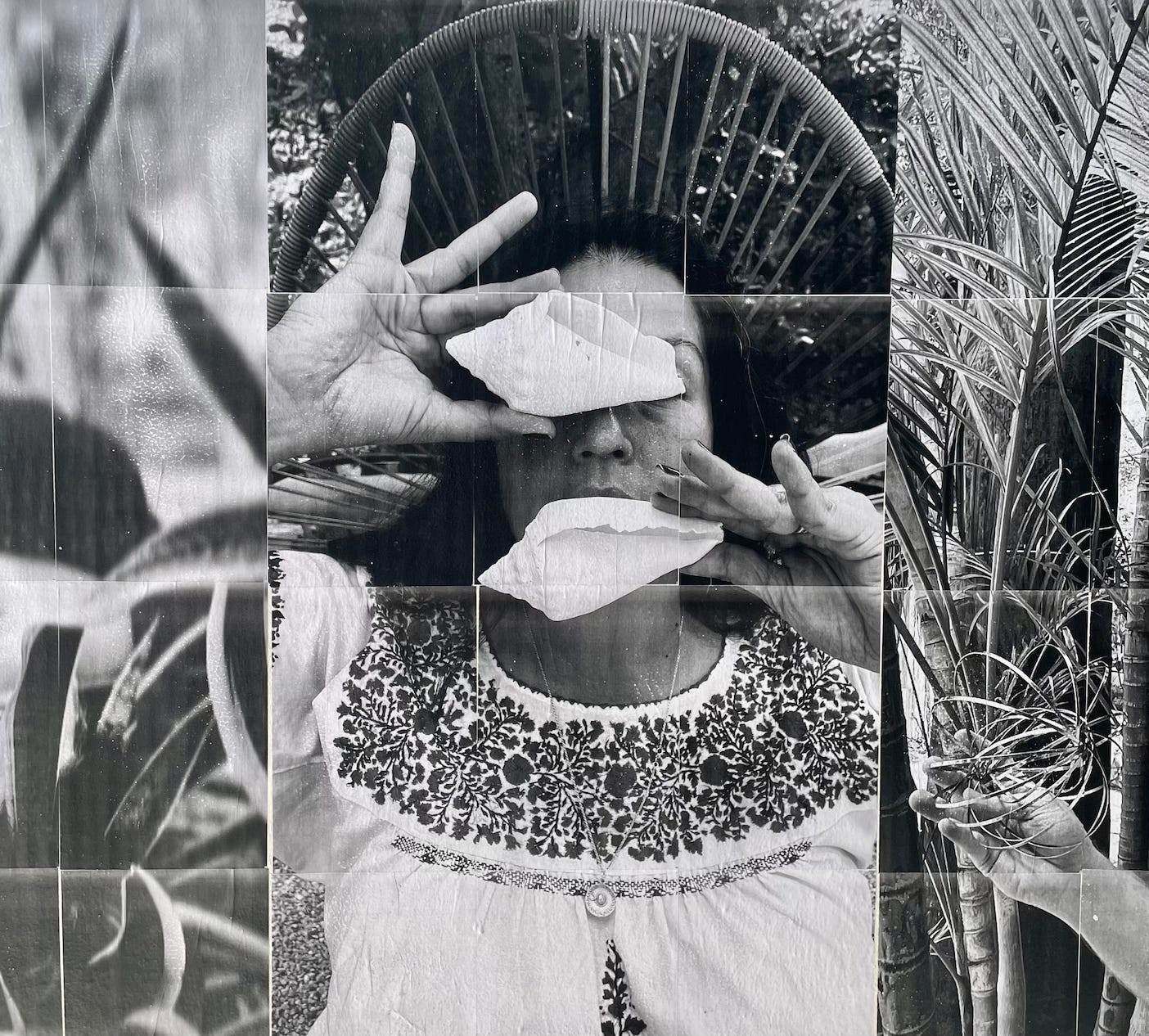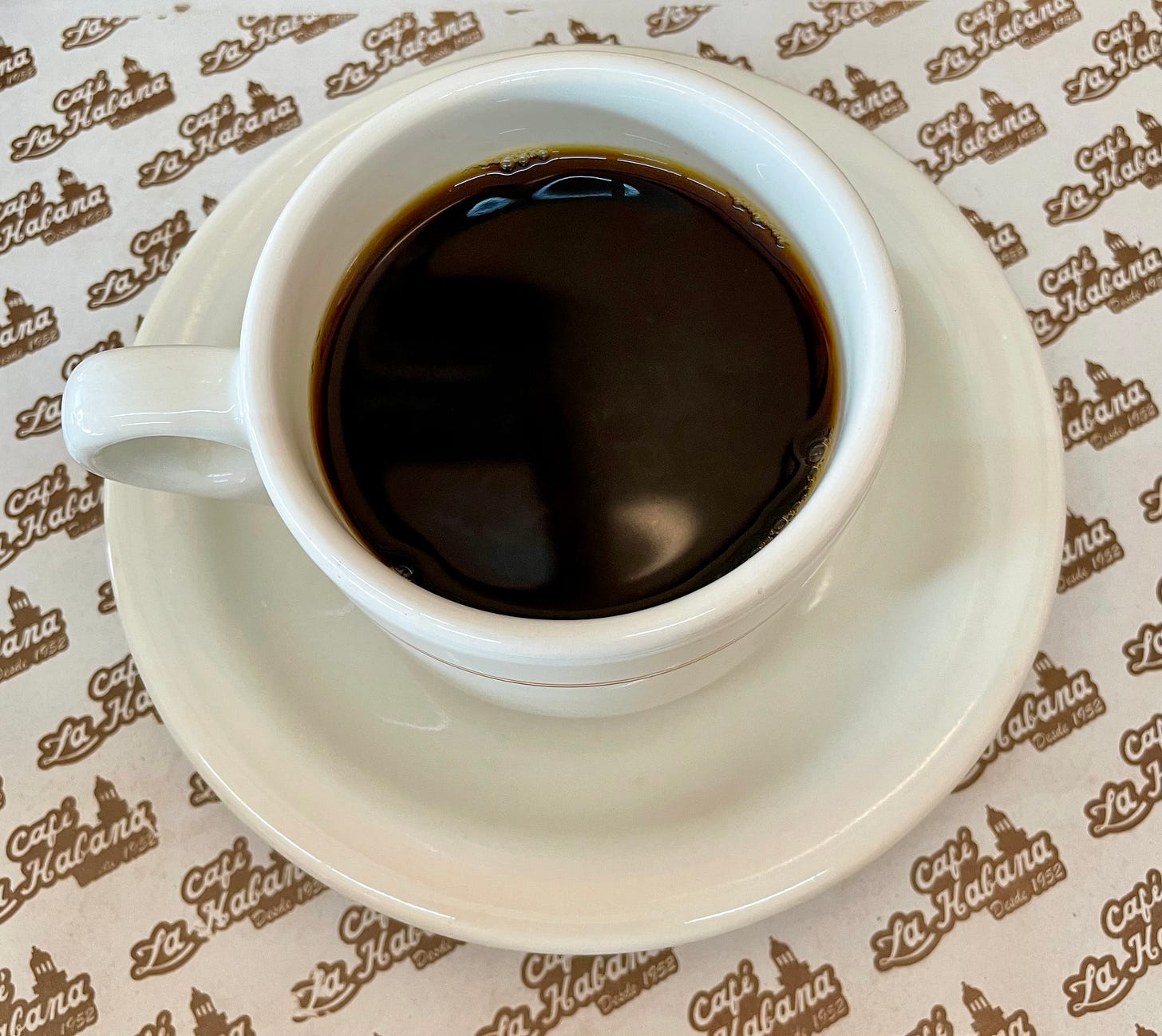Greetings from San Diego! I just got back from a two-day trip to Pasadena. My wife facilitates professional development for educators. (Nuvia does a lot more than that but that’s the short version). She travels for work a lot and sometimes I tag along. She’s a bilingual educator and is in high demand at Spanish-speaking schools around the world. That’s why these newsletters occasionally come to you from far off places and also partly why I’m finally getting serious about learning to speak Spanish.
I’m not much of a tourist but I love writing in hotels. (I started this newsletter in a hotel in Pasadena.) When I was in Mexico City last week, we made the trek to La Habana Café, an institution that has attracted writers and thinkers from all over the Spanish-speaking world, including Gabriel Garcia Marquez, Octavio Paz, and Roberto Bolaño. It’s an old school type of place with a fabulous bar that still roasts its own coffee in what looks like the same equipment from when the joint opened 70 years ago. There’s a scene (multiple scenes?) in Bolaño’s The Savage Detectives set here and it’s the kind of place you can imagine filled with smoke, the clatter of coffee cups, and customers calling out for tequila and beer. It’s a lot different now. While the coffee is strong—like super strong—the food is borderline terrible.
I started writing short stories longhand when I forgot to pack a charger for my computer on a trip to Merida in 2013. I wrote two long short stories on that trip and have kept up the habit ever since—especially when I’m traveling, which is when the urge to write short stories is the strongest. I haven’t been writing many short stories lately, but I had an idea for a crime story set in a haunted house that I’ve been kicking around for a year. I wrote several scenes in my notebook during a visit to Valle de Guadalupe last year and hadn’t gotten back to it. (Maybe I’m only a short story writer in Mexico?)
In Merida, after my Spanish lessons, I typed out those scenes on my laptop and felt like I had the makings of a good story, a story that was even further along than I remembered. I was looking forward to getting back to it when a funny thing happened at La Habana. An idea for the ending of the story came to me and I quickly jotted it down in my notebook. Then I had an idea for another scene and then another after that. I’m not saying that the spirits of those writers were moving through me because that’s stupid, but every writer knows that when the words start to flow don’t mess with the mojo.
I didn’t knock out the story over breakfast because that’s not how writing works, but for the rest of the week I got out of bed around six in the morning and made my way to the hotel lobby to work on the story for an hour or two before the day’s activities. On Saturday, sensing I was close to finishing, I spent a few hours at a café in Roma where something very unusual happened.
A character with a face full of tattoos made his way to my table. He was dressed in a colorful suit jacket and wore a hat with feathers sticking out of it. I’d seen him approach the other tables outside the café. He had a pitch I didn’t quite catch, hitting up patrons for pesos. He offered me a leaf, which he described as a mystical flower, and in exchange I gave him the pesos I had in my pocket. He went on with his day and I went on with mine, tapping away at my laptop, pushing the story across the finish line. That’s when things got strange. An idea for a twist at the end of the story arrived and when I looked down at the leaf it was glowing, not glowing but trembling, not trembling but fluttering in the breeze blowing through the streets of Roma.
Okay, that’s not true. Here’s what happened: I finished the story that afternoon but it wasn’t because of the ghost of Roberto Bolaño or a magical talisman. Making my way through the universe I wrote a story that was influenced by the places I went, the books I read, the people with whom I interacted. It is a result of the alchemy of the imagination, a mix of memory and conjuration. To say anything more risks venturing into the realm of the corndog.
However, to chalk up the writing of the story (or painting of a picture, or composition of a song, etc.) as another day at the office is to miss out on a meaningful milestone. Look, the story will most likely never win an award or be made into a movie or appear in a book on a bestseller list. The odds are against it even being published. These things have nothing to do with the writing of the story. Whatever happens next is mostly out of my control, which is why it’s so important to let the work be its own reward.
I read a handful of books during my travels last month that I can’t stop thinking about. Regular readers will recall I attended a conversation between Joshua Mohr and Jerry Stahl about his new travel memoir, Nein, Nein, Nein! Stahl afficionados may recall this was a line in his first memoir, Permanent Midnight, a book that set the bar for writing about living with addiction with pitiless clarity and mordant wit.
The set-up for Nein, Nein, Nein! is incredibly bleak: in the midst of personal and professional crises, Stahl embarked on a bus tour of concentration camps in Poland and Germany with a handful of strangers. It sounds likes something Hunter S. Thompson would pitch to Rolling Stone in the middle of a cocaine-induced psychotic episode, but Stahl actually went through with it.
There’s a saying in AA that goes “Wherever you go, there you are,” which is another spin on “You can’t run from your problems.” Although the book is front-loaded with self-deprecating humor, things get very, very dark, leading to some of Stahl’s most poignant writing about the very fucked up things we do to each other on spaceship earth.
If you are drawn to darkness, there are few writers working right now who are as dark as Fernanda Melchor. Her novel Hurricane Season, translated from the Spanish by Sophie Hughes, was shortlisted for the International Booker Prize, and it’s easy to see why. Melchor fuses crime and horror to create devastating portraits of 21st century Mexico. Like Hurricane Season, her new novella Paradais, also translated by Sophie Hughes, is set in Veracruz where the swampy heat is its own character, and the prose runs in long—but fast-moving—Faulknerian paragraphs.
Paradais begins with a story of youthful obsession perverted to the point of madness. I won’t get into the particulars and risk spoiling the story because it’s such a slender book, but Paradais is fueled by a toxic stew of addiction and misogyny and has an explosive finish. It’s not for everyone, but there is no one writing like Melchor right now. For my money she’s the heir to Bolaño.
I bought two of Melchor’s books in Mexico City that aren’t available in English yet, including Aquí no es Miami. I’d love to be able to read them in Spanish some day, but Sophie Hughes is on the case and the book will be published in English in May 2023.
Speaking of Bolaño, I’m currently reading Tres a collection of three hybrid pieces—including one about a touring Chilean rock band—presented in a bilingual edition (with English translated by Laura Healy). It’s slow going because I’m reading in both Spanish and English. I always enjoy reading Bolaño and even though my comprehension is still marginal at best, for the first time I’m reading him in Spanish—alongside the translator’s interpretation. I think one of the reasons I’ve been feeling so creative these last few weeks is that struggling with Spanish and engaging with words in multiple languages is stimulating me in new ways. To learn a language is to be actively curious—What does that mean? How do you say this?—and my brain is responding.
Have you experienced this? If so, let me know. I’d love to hear about your favorite contemporary Spanish-language writers right now. Until next time, be well and stay safe.





Thank you, Elmer! I have some books by Enrique Vila-Matas but haven't read him yet. Nor have I read Don Quixote! But I hope to change that...
Contemporary translations of Rafael Bernal’s stuff have been great. Katherine Silver’s translation of The Mongolian Conspiracy for sure but especially Kit Schluter’s translation of His Name Was Death. Not as directly connected to Bolaño as Melchior but for Bolaño-heads I certainly recommend this small Bernalaissance